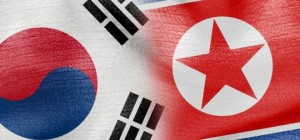North–South differences in the Korean language
There are a small number of differences in the standard forms of the Korean language used in the Democratic People’s Republic of Korea (North Korea; hereafter “the North”) and the Republic of Korea (South Korea; hereafter “the South”), due to the length of time Korea has been divided.
1. Letters: The same Hangeul letters are used to write the language in the North and the South. However, in the North, the stroke that distinguishes ㅌ |tʰ| from ㄷ |t| is written above rather than inside the letter as in the South.
|
Letter |
North Korean name |
South Korean name |
|
ㄱ |k| |
기윽 [kiɯk̚] | 기역 [kijʌk̚] |
|
ㄷ |t| |
디읃 [tiɯt̚] | 디귿 [tiɡɯt̚] |
|
ㅅ |s| |
시읏 [ɕiɯt̚] | 시옷 [ɕiot̚] |
|
ㄲ |k͈| |
된기윽 [tøːnɡiɯk̚] | 쌍기역 [s͈aŋɡijʌk̚] |
|
ㄸ |t͈| |
된디읃 [tøːndiɯt̚] | 쌍디귿 [s͈aŋdiɡɯt̚] |
|
ㅃ |p͈| |
된비읍 [tøːnbiɯp̚] | 쌍비읍 [s͈aŋbiɯp̚] |
|
ㅆ |s͈| |
된시읏 [tøːnɕiɯt̚] | 쌍시옷 [s͈aŋɕiot̚] |
|
ㅉ |tɕ͈| |
된지읒 [tøːndʑiɯt̚] | 쌍지읒 [s͈aŋdʑiɯt̚] |
2. Pronunciation: The standard languages in the North and the South share the same types and the same number of phonemes, but there are some differences in the actual pronunciations. The South Korean standard pronunciation is based on the dialect as spoken in Seoul, but the North Korean standard pronunciation is based on the dialect as spoken in Pyongyang.
3. Emphasis: In the North, names of leaders 김일성 (Kim Il-sung), 김정일 (Kim Jong-il) and 김정은 (Kim Jong-un) are always set off from surrounding text, typically by bolding the characters or increasing the font size.
Reference
Jochen-Martin Gutsch (2012), Germans Give Pep Talks on Korean Unification Der Spiegel .




Latest Comments